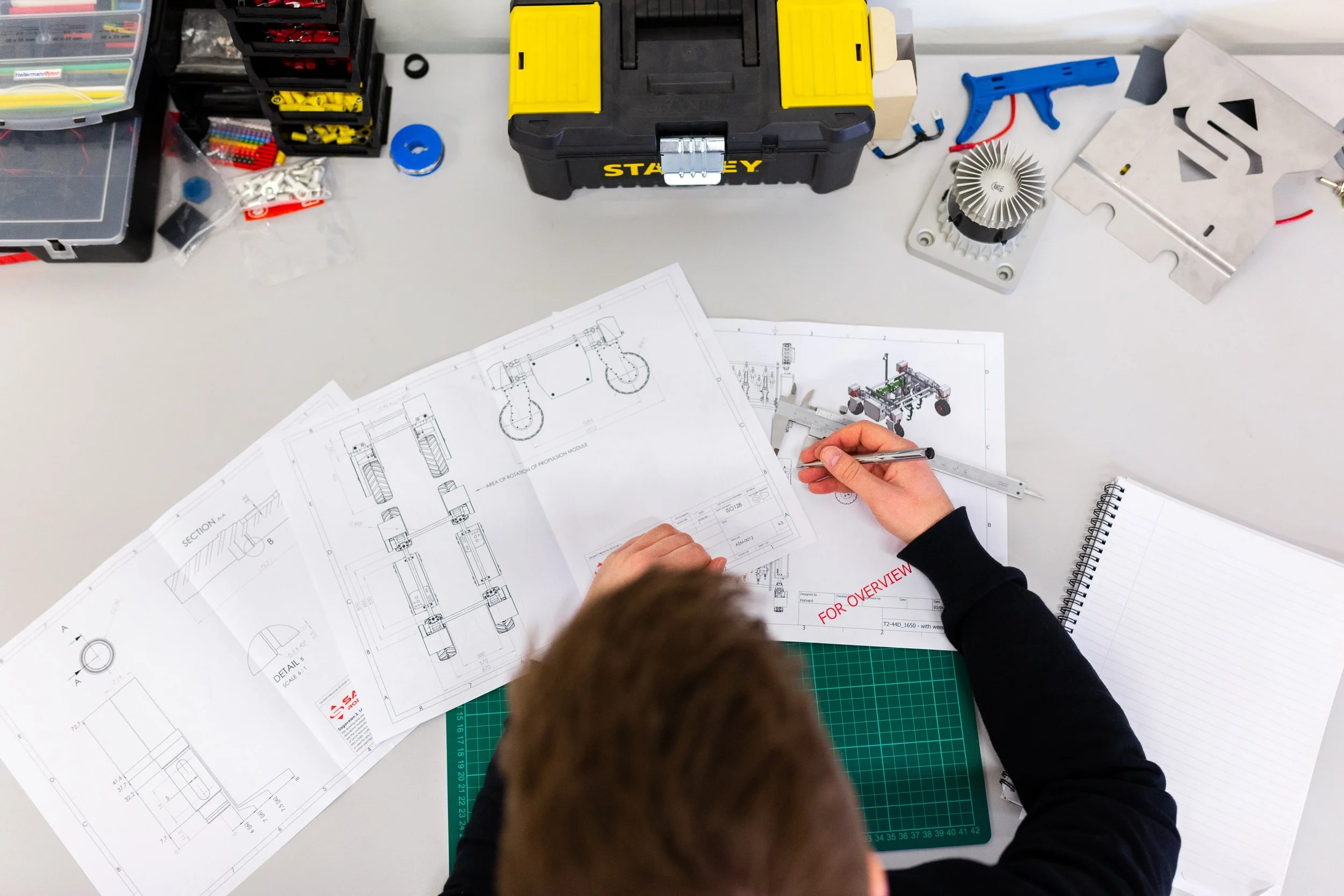Illuminating Your Path to an Engineering Major and Career
When a high school student comes to us for help to apply to college to study engineering, our first step is to get a sense of how clear their interest is. Are they interested in one specific field of engineering, and if so, what is the basis for this interest? If not, are there different types of engineering that they are considering and why? For instance, students interested in computers may gravitate to computer science, electrical engineering, and computer engineering. Or is a student generally interested in engineering and wondering if it is what they want to do? Typically, this type of student enjoys math and science classes and perhaps building and making things but doesn’t know a lot about specific engineering fields.
For students trying to understand how the major engineering disciplines differ, from mechanical to biomedical to computer engineering, our complete guide to choosing an engineering major offers a structured overview of each field and the kinds of students who thrive in them
For a comprehensive overview of how clarity of direction shapes the engineering admissions process, see our complete guide to engineering college admissions.
What types of schools and programs are available to students who want to study engineering?
In the US, the term college is often used to refer to any institution of higher education that a student attends after high school, even though students attend a range of types of places, including both colleges and universities. At its most basic level, the distinction between a college and a university is that a college offers undergraduate degrees. In contrast, a university grants degrees beyond undergraduate degrees, such as doctoral degrees. That is, colleges have undergraduate students, while universities have undergraduate, graduate, and professional students.
This fundamental distinction leads to some general statements.*
Colleges focus on undergraduates. Universities have other constituencies to focus on.
Colleges have one school and one campus. Universities have multiple schools or colleges, such as a School of Engineering, a School of Arts and Sciences, and a School of Science, and possibly several campuses.
Usually, a student may pursue any major offered by a college. At a university, students are often admitted to a specific school, limiting their academic choices. In terms of majors, they may have all majors within their school available to them or be restricted to a particular major within the school. For example, in 2020, students admitted to Computer Science and Computer Engineering majors in the Paul Allen School of Computer Science and Engineering at the University of Washington could choose to major in Computer Science or Computer Engineering but not a different engineering major within the Paul Allen School. Likewise, at Johns Hopkins University, which boasts the top-ranked biomedical engineering program, it is difficult to major in biomedical engineering if a student has not been admitted to this major at the time of acceptance.
Colleges offer one degree and one set of degree requirements for all students. Universities offer a number of degrees with various undergraduate degree requirements. A School of Engineering will have different requirements from a School of Arts and Sciences.
Colleges are usually small, enrolling less than 3000 students. Universities are typically larger than 5000 students, sometimes much. For instance, Pennsylvania State’s main campus enrolls over 65,000 undergraduate students.
At colleges, an undergraduate student will be taught by faculty. At universities, undergraduates will be taught by faculty and graduate students.
Colleges focus less on research and more on teaching. The reverse is true at universities.
Since colleges are smaller, the curriculum may be less wide and deep. Universities offer more academic options: faculty, courses, majors, and programs.
Many colleges do not offer engineering, although exceptions are noted below
*There are colleges and universities which are exceptions to each of these general statements
What colleges have engineering majors (degrees)?
Most people immediately think of large R1 research universities when considering schools to study engineering. Indeed, the top 50-ranked engineering programs and the top 50-ranked undergraduate engineering programs, according to US News and World Report, are exclusively large research universities. The most common path is to pursue an engineering degree at a large R1 university within its School of Engineering.
However, there are several small colleges and universities worth considering that offer engineering. For a deeper discussion of why some students thrive in smaller, undergraduate-focused engineering environments, see Small Colleges to Study Engineering: Why Size Isn’t a Disadvantage.
These schools are sometimes specialized, so they may only be a good fit for some students. A prime example is Webb Institute, which has only one degree in naval architecture and marine engineering (it is worth noting that every US citizen and Permanent Resident who enrolls at Webb receives a full-tuition scholarship.)
These smaller institutions have fewer majors and degree options than a full-fledged R1 research university with a School of Engineering. Still, they may be an excellent match for the student seeking a smaller undergraduate-focused experience:
There are also colleges (and universities) that offer engineering through relationships with neighboring institutions via double- or dual-degree programs:
Wellesley College and Olin and MIT (which I created when I was a dean at Wellesley College)
And there are many others. Despite having created the double-degree programs at Wellesley College, I routinely steer students from such programs since they are typically a good match for only a few students. Usually, the best choice for a student is to go to a single institution where they can achieve all of their academic goals.
Case Study 1:
The student with clear direction in one engineering discipline
When Kyle came to me seeking help to apply to college, he confidently said he wanted to study chemical engineering. His high school coursework supported this direction, which included strong grades in rigorous (AP) science and math classes, especially chemistry, and courses such as Principles of Engineering and Advanced Engineering. Outside of his high school curriculum, he had had significant exposure to engineering. He had participated in several state and university technology, engineering, and applied science competitions, earning honors. Also, in two internship experiences at a chemical engineering company, he worked in an industrial manufacturing environment on a process to convert liquids to powders for flavoring and fragrances. Through our conversation, I recognized that he had a strong understanding of chemical engineering and possessed the skills and experiences to pursue an engineering degree. His interest was authentic, and his direction was realistic. To build Kyle's list, I identified schools with chemical engineering programs that otherwise met his non-academic criteria (such as geography, size, co-curricular opportunities, etc.) and helped him develop a balanced list (in terms of admissions probability) through thoughtful research. He had excellent outcomes and will be attending Northeastern University in the fall of 2023.
What strengths and interests do different engineering fields require?
When guiding a student with clear direction in a specific engineering discipline, it is important to outline the curricular expectations for the field. For instance, chemical and biological engineers and environmental engineers should expect to take a lot of chemistry in college. Biomedical engineers will need to take a lot of biology and chemistry courses. Electrical engineering is the most mathematically based engineering discipline, and so students studying electrical engineering will take more math than otherwise. Students enjoying AP Physics C: Mechanics in high school may be a good fit for mechanical engineering as this is the basis for the discipline and future coursework in college. Likewise, students who enjoy AP Physics C: Electricity and Magnetism, if they have the opportunity to take it in high school, may be a good fit for electrical engineering.
Also, when a student is clear in their direction, factors such as support for undecided students to decide their major and flexibility to switch majors and schools are less important.
Case Study 2:
The student with a clear direction in engineering but undecided about the discipline
When William and I began working together, he said that he thought he wanted to study computer science, computer engineering, or electrical engineering. (Students considering computer science pathways, should see our complete guide to computer science admissions.) Like Kyle, William’s high school coursework supported this direction. He had taken and excelled in AP Computer Science Principles, AP Computer Science A, and rigorous math and science classes. He is planning dual enrollment in a CS course for his senior year to extend his high school offerings. Another thing I noted is that he had taken some studio art classes. Engineers and artists are makers, so in addition to engagement in math, science, and engineering, engagement in art activities can also be a sign of an authentic interest in engineering. William and I are building his college list, so how things end up for him is still in the future. My approach is to identify schools that offer majors in computer science (CS), electrical engineering (EE), and computer engineering (CPE) with the flexibility to move between these fields and that otherwise meet his non-academic criteria. I am steering him from institutions with impacted (or capped) CS, EE, and CPE majors that would not fit him well, such as Carnegie Mellon University and many of the University of California schools. In addition to universities that support some degree of flexibility, I've included some of the smaller colleges on his list for him to consider: Colorado School of Mines, Olin, and Rose-Hulman. Lastly, he expressed a strong interest in coops, so I've included schools like Drexel, Northeastern, and the University of Cincinnati. I am excited that he is open to considering the range of places I’m presenting to him.
Case Study 3:
The student who wants to study STEM but isn’t sure if they want to study engineering
Elizabeth was a strong student in math and science in high school. She loved biology and had done two summer internships doing biological research at UMass Medical Center but had little computer science or engineering exposure. Elizabeth told me she might want to study applied biology, such as biomedical engineering, but was reluctant to commit to applying to a school of engineering. This fact, and the fact that she did not have a lot of engineering experience to make a strong application as an engineering major, meant that I approached her college search process very differently than for Kyle and William. Her search was similar to that of an undecided student. Specifically, I guided her to apply as a biology major to schools that offered biology and applied biology programs and the flexibility to explore and move between them. After considering her other nonacademic criteria, I included schools such as Brown, Emory, Johns Hopkins, MIT, Swarthmore, Tufts, and the University of Rochester on her list. Ultimately, she chose between Emory, Rochester, Swarthmore and Tufts, selecting Tufts. At the end of her first year at Tufts, she internally transferred from the School of Arts and Sciences at Tufts to the School of Engineering and graduated with a degree in biomedical engineering in 2020. She went on to work at MIT Lincoln Laboratory in biodefense for two years and is now earning a master’s degree in bioinformatics at Harvard Medical School.
What criteria should your child consider to identify good-fit engineering programs? Students, what type of education do you want?
Rankings do not determine fit.
College or university? As described above and more extensively here, the type of institution will impact the student experience.
Well-rounded or “STEM-pointy”?
The education available at specialized or technical institutes is usually “pointier” than at institutes with a full range of academic offerings where students may take courses, minor, and have a second major in a field outside of engineering.
General engineering programs like those at Wake Forest University, Smith College, or Swarthmore College provide alternatives to traditional, more STEM-focused engineering programs. For a deeper look at this kind of interdisciplinary, human-centered approach, see How Liberal Arts Engineering Degrees Prepare Students for an AI Future.
Engineering-adjacent majors such as human factors engineering, human-computer interaction, engineering psychology, geographic information systems (GIS), computational biology, informatics, digital arts and media, cognitive science, statistics and machine learning, and applied and computational mathematics provide less STEM-intensive yet engineering-related pathways.
Some schools offer majors or minors in engineering to students enrolled in a traditional School of Arts and Sciences. For instance, at Tufts, Arts and Sciences students can major in biomedical sciences and biotechnology, majors offered by the School of Engineering. Also, Arts and Sciences students can minor in seven School of Engineering minors: architectural engineering, biotechnology, engineering management, entrepreneurship, environmental science and policy, geosystems engineering, and music engineering.
What are the requirements for the major and the degree? Knowing what you will need to take to earn your degree is essential. What are the major requirements and the requirements that “wrap around” the major, often called general education, distribution, breadth, or core requirements? One fall, a week into the semester, a former Tufts student who transferred out of Tufts to the University of Notre Dame called me asking if he could return to Tufts after learning that he would need to take two theology courses to earn his engineering degree, something he did not realize when he made his decision!
Hands-on vs. more theoretical? Different schools have different approaches to teaching engineering, with some being more hands-on than others. For example, Carnegie Mellon University, where I got my MS and Ph.D., was founded by Andrew Carnegie, one of America’s greatest industrialists, and is well-known for educating students who learn strong skills valued by industry. This more practical approach was a valuable balance to the research-based Hopkins education I had received while earning my BS in EE degree. At Hopkins, I learned to prove things. At CMU, I learned to build them. I used machines new to me and collected data on hardware platforms I had built rather than simulated environments. What type of thinker are you? What kind of thinker do you want to become?
Do you know what you want to study or not? If not, what type of support is there for undecided students? Undecided engineers? How flexible is the institution in terms of being able to move between majors and schools? Take coursework in non-engineering discipline? Pursue a non-engineering minor or major? For example, Drexel University supports undecided engineers through its undeclared engineering major. If you're still exploring STEM options or unsure which direction is right for you, see Navigating the College Search for the Undecided STEM Student for tips on finding flexible, supportive programs.
Is an ABET degree important to you? Should it be?
Do you want a coop as an option? If so, look for programs that include this as part of the educational experience (Drexel, Northeastern, University of Cincinnati, and others.)
How do you want to learn to think? For STEM-interested students who are unsure about engineering vs. science, like Elizabeth, consider that engineers and scientists are trained to think differently. Recognize that how you learn to think transcends what you learn - the actual content. The way you think can be applied to many different careers. I no longer work as an engineer but regularly use my engineering problem-solving skills in my day-to-day work.
Remember the big six college experiences linked to life preparedness and look for the potential for having these experiences.
Frequently Asked Questions
How do I know which engineering major is right for me?
Students should evaluate both their academic strengths and the kinds of problems they enjoy solving. Reviewing curricular expectations across engineering disciplines and reflecting on hands-on experiences can clarify fit.
Should I apply directly to an engineering major or stay undecided?
That depends on how clear your direction is and how flexible the institution is. Some schools require direct admission to engineering majors, while others allow exploration before declaring.
Are small colleges good for engineering?
For many students, yes. Smaller, undergraduate-focused institutions often provide earlier hands-on work, close faculty mentorship, and cohesive engineering communities.




